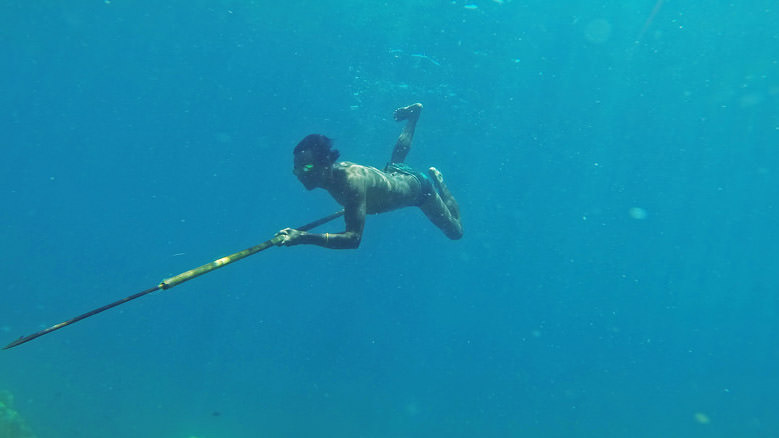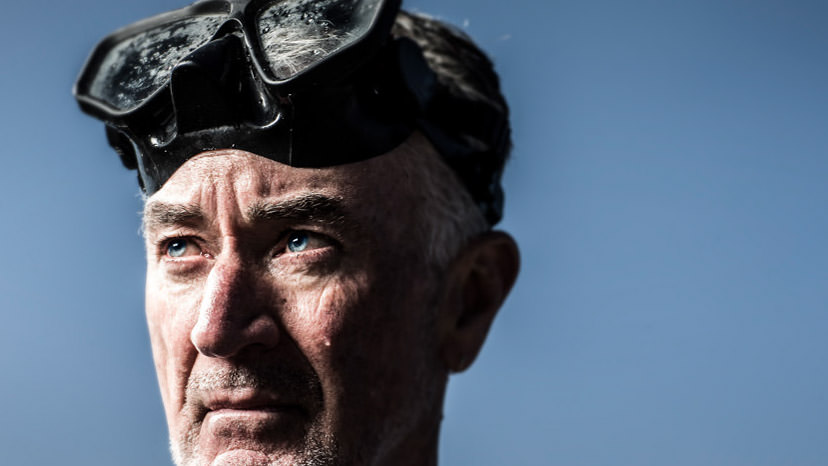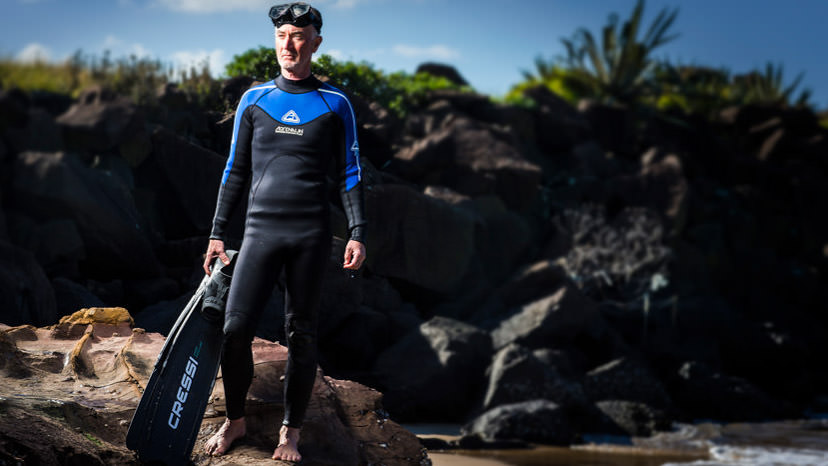[Music]
For me, it is not difficult. Driving is my second nature and I don't need a mask.
[Music]
:format(jpg)/prod01/channel_3/assets/contributed/magazines/the-stand/2017-07/1920X841_Michael-Adams.pdj_.24.05.17.009%5BT4crop-mobile%5D.jpg)
UOW academic shares how freediving allows people to connect to the natural world.
July 25, 2017
Associate Professor Michael Adams explores the fine line between life and death through freediving.
Ten metres below the surface of the ocean there is a point of neutral buoyancy where a diver no longer floats towards the surface but hovers, suspended, before descending deeper still. Unfamiliar to most, it is a place Michael Adams has been many times before.
"At this depth the pressure on my body is double what it is at the surface: my heartbeat has slowed, blood has started to withdraw from my extremities and move into the space my compressed lungs have created … the weight of the water above cancels my body's natural flotation. I turn head down, straighten my body, kick gently, and begin to fall with the unimpeded gravitational pull to the heart of the Earth."
Taken from his essay 'Salt Blood', recently awarded the Australian Book Review's 2017 Calibre Essay Prize, this is a moment of physical immersion and mental acuity from a freediver. The essay is an extension of Associate Professor Adams's academic work, which focuses on the relationships that people, particularly Indigenous cultures, have with the natural world.
Freediving is a traditional practice amongst many Indigenous peoples, like Japanese "ama" ("sea women") and the Moken sea gypsies of Thailand, who forage from the sea floor. Better known perhaps as an extreme sport, freediving is also an expression of the connection of those people with our blue planet: the most profound engagement between humans and oceans.
In 'Salt Blood', the ease and fluidity of Michael's words perhaps do not reflect the labour it took to bring the piece together: "I had been researching freediving for three years before writing the essay and kept saying, 'I'm about to publish this,' but it wasn't working for me," he says.
Unable to fit his experiences of freediving into a typical academic paper, Michael says that using the essay form freed him to explore the strong personal response he had to the practice.
Michael returned to nature to write the essay, capitalising on the solitude of a 10-day artist residency at Bundanon, on the Shoalhaven River south of Wollongong. He could hike every day and did part of his thinking there, not at a desk, but out in the bush.
"I wrote the first draft in three days," he says. "That's when Nam [Le, Vietnamese-born Australian writer and author of The Boat] read it and told me, 'You're on the edge of something here, but you need to implicate yourself, make yourself more vulnerable'."
From a gentle introduction to breath-hold diving, an otherwise frightening practice for the unacquainted, Michael delves deeper. He describes what it is like to be confronted with mortality when freediving, reflects on the loss of his father, whose suicide he has failed to understand since the age of 14, and mulls over the grace and solace to be found in the ocean.
"It was this paradox where freedivers kept insistently saying to me, 'We don't think about death. Freediving is not to do with being close to death,' but that wasn't what I was feeling about it." Coincidently, when he began freediving, Michael found his father's death certificate stashed among other documents, a one-page typed form with single word entries; a forthright statement of a lonesome death.
"It was a real shock to see that at the same time I was trying to work through this idea about death in freediving. In the end, those two things" - he interlaces his hands - "just came together."
[Music]
For me, it is not difficult. Driving is my second nature and I don't need a mask.
[Music]
Reading excepts from 'Salt Blood' at an event to celebrate the Calibre Essay Prize in June, Michael draws a breath before sharing with the audience the lines about his late father, no distance now between himself and the reader.
He picks up the pace again when speaking about his travels and recent dives, finding excitement anew in his descriptions of Honaunau Bay, Hawaii, and Jemeluk Bay, Bali, where there is great depth close to shore: within 100 metres of shore you can be in 100 metres depth of water.
"The essay form is about taking risks and opening up, about questioning instead of answering, so the [Calibre Essay] prize is an incredible affirmation of taking that risk," Michael says. The essay opened doors to conversations with people Michael knew well but who had never spoken about suicide and loss in their own family.
"I had people get in touch in a very positive way, saying thanks for writing this because we're still grappling with our loss. That was beautiful," he says.
"It was this paradox where freedivers kept insistently saying to me, ‘We don’t think about death. Freediving is not to do with being close to death,’ but that wasn’t what I was feeling about it." - Michael Adams
Even before 'Salt Blood' Associate Professor Adams has not, in his own words, walked a conventional academic path. His first degree was in English literature - he cites William Shakespeare, Herman Melville and Tim Winton in his acknowledgements for 'Salt Blood' - so you could say that writing has always been a thread in his story.
After time as a social worker with Aboriginal youth in Redfern, Sydney, there was a second degree in landscape architecture and a stint with environmental conservationists.
He arrived at his PhD at the age of 40, later than most but with a wealth of on-the-ground experience. Michael set about redefining the relationships between Aboriginal lands and biodiversity conservation in Australia in his PhD studies, drawing on previous field work with the National Parks and Wildlife Service and as an environmental consultant.
"I was conducting research on how to get a better deal for Aboriginal people in national parks or World Heritage Areas," he says. Most conservation efforts are focused in these types of protected areas but inadvertently these boundaries (and costly permits to regulate harvesting practices) can exclude Indigenous people by restricting their ability to use and occupy the country that they have cared for over 50,000 years.

Often called sea nomads or sea gypsies, the Moken are a seafaring people who for centuries lived nomadically on the Andaman Sea. Photo: Taylor Weidman / Getty Images
This work Michael has continued since, studying the interplay between Indigenous peoples' knowledge of the natural world and our attempted governance of wild places. Learning from Aboriginal people about their ancient traditions of "caring for Country", and integrating their knowledge into conservation efforts, presents an opportunity for shared governance of our natural spaces under threat.
Michael describes experiences on land, stories from across the country, Cape York to Tasmania, with the same intensity as those underwater. "My time with Indigenous people has been an incredible privilege," he says, reflecting on what he has learnt about Indigenous spirituality and the continuity of their culture by going bush with Aboriginal people.
"In town, people were angry and stressed ... but those exact same people would say, ‘If you can get a vehicle, let’s go bush,’ and they were transformed. They put their bare feet on Country and they are different people in all sorts of ways." - Michael Adams
"In my PhD, in Cape York, we were dealing with policy issues like tenure, boundaries and law. In town, people were angry and stressed, often combative with me even when I was working for them, but those exact same people would say, 'If you can get a vehicle, let's go bush,' and they were transformed.
All the time they were talking to me about spirituality. They put their bare feet on Country and they are different people in all sorts of ways," Michael says. He continues, describing how as they were driving along, he would be asked to stop in the middle of nowhere - to Michael, there was nothing unusual in the landscape to designate a sacred site. The group would get out of the car, moving slowly, talking quietly about the significance of the place.
Even the kids were still. "Policy is important but there is this other dimension, that I think is more important, which is our relationship to the planet," Michael says. Beyond Australia, he has spent time with Indigenous communities in arctic Sweden and equatorial Indonesia.

Michael Adams had been freediving for three years before publishing his essay. Photo: Paul Jones
In his usual office, as Associate Professor of Human Geography in the School of Geography and Sustainable Communities, Michael has keepsakes of his field work and many travels. But he quotes geographer Cindi Katz to explain that geographers are always, everywhere, in the field: "We are always emplaced and embodied in what we are thinking - this conversation right now is in the field."
So, in both his personal and academic writing, Michael documents experiential learning, examining his whole embodied response to immersive and emotive practices like freediving, going bush and hunting. "I want to write myself into my work," he says, on many occasions.
Full immersion methodologies have been adopted in research - first in sociology, now in human geography - as a tool to better understand the nature of certain human relationships. Becoming one of the people, getting inside their minds, is key to understanding, for example, why firefighters enter high-risk environments or the counter-intuitive moral considerations of hunters.
"With hunting, I was the thing that I was researching and in freediving it was the same. There were questions that I could not have asked, would not have thought to ask, without having the experience for myself." - Michael Adams
Michael describes it as getting deeply and actively involved in lives and landscapes. "That's what I did with hunting, which in a way was the only way it was going to work because hunters are so resistant," he says. Michael acquired his gun licence and learnt to hunt.
In the process, he found parallels between the detailed knowledge, intuition and skill of hunters and that of Indigenous cultures - both derived from a long-term engagement with the land.
"I was the thing that I was researching and in freediving it was the same. There were questions that I could not have asked, would not have thought to ask, without having the experience for myself," Michael says. He was struck by how difficult it was to avoid the moral implications of hunting, moving him to examine the practice in a new light.

In both his personal and academic writing, Michael Adams documents experiential learning. Photo: Paul Jones
Michael takes the same approach to his teaching as he does with his research, writing and diving. "I do full-immersion research; this is full-immersion teaching," he says with a grin, an upcoming trip to Bali with students on his mind. Immersive learning experiences, akin to throwing yourself in the deep end, are encouraged with regards to language learning.
Michael and colleagues are now applying the method to the geography department. He speaks eagerly about the 'Uncertain Islands: Geographies of Change' course, now in its second iteration, that integrates a two-week field trip where students choose and conduct their own research projects with the local community. In 2015, Michael took students to the Andaman Islands, an archipelago between the Indian subcontinent and South East Asia, to investigate social and environmental change.
"In a cultural sense, in the Andaman Islands, we were a minority among Indian people so there was the cultural immersion, a natural immersion but also structured research," he explains. Projects included surveying snakes among the mangroves, studies of marine debris washed ashore and an analysis of the local food supply chain. "It was wonderful to see the strengths of these young people in these situations."
"My son, my daughter and I, we dive in the waters of the Dharawal people off the coast of Wollongong. It was a gift to me from other people and I have been able to give that to my children." - Michael Adams
Michael speaks highly of his own children too, with whom he hunts and dives, although he admits it has been confronting to introduce them to intense and risky environments. In teaching them the practical skills of hunting and diving he hopes that the underlying attitudinal values will surface - physical and spiritual grace, resilience and an acceptance of uncertainty born from transformative encounters in the natural world - to equip them in a world with an uncertain future.
"Indigenous communities that we think of as marginalised, as vulnerable, locked in the past, have an amazing ability to deal with adversity. The strengths in those communities are derived from the strength of their cultural traditions," he says. "My son, my daughter and I, we dive in the waters of the Dharawal and Yuin people off the coast of Wollongong. It was a gift to me from other people - that feeling of being at home in the bush or the ocean - and I have been able to give that to my children."
Michael is passing on these traditions in his own way, in his own words.
If this topic causes you hardship, you can seek help by calling Lifeline on 13 11 14.